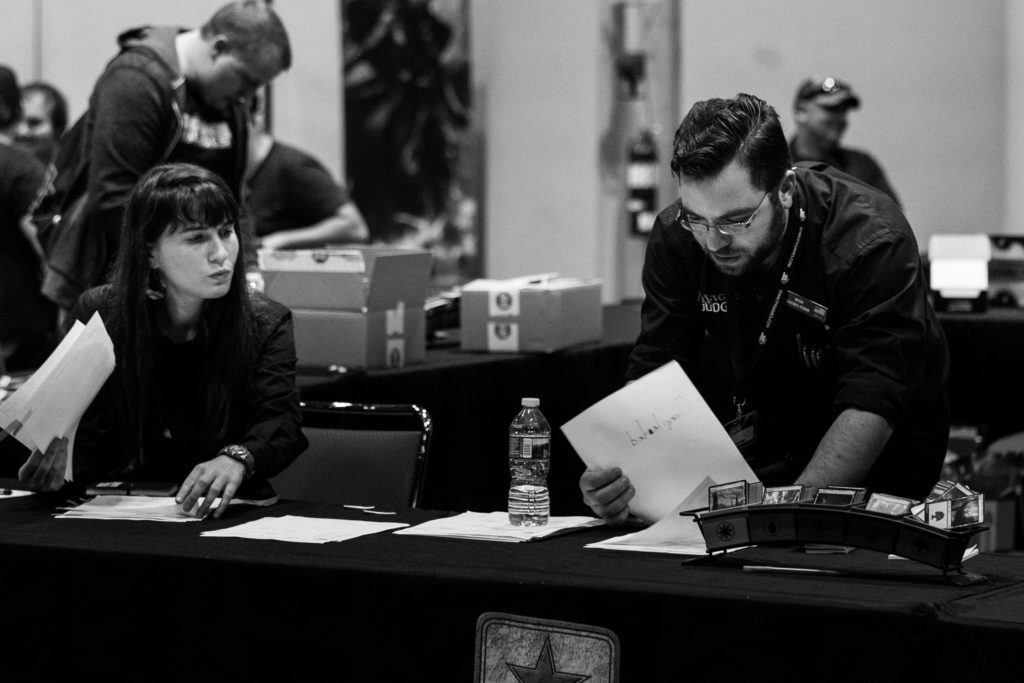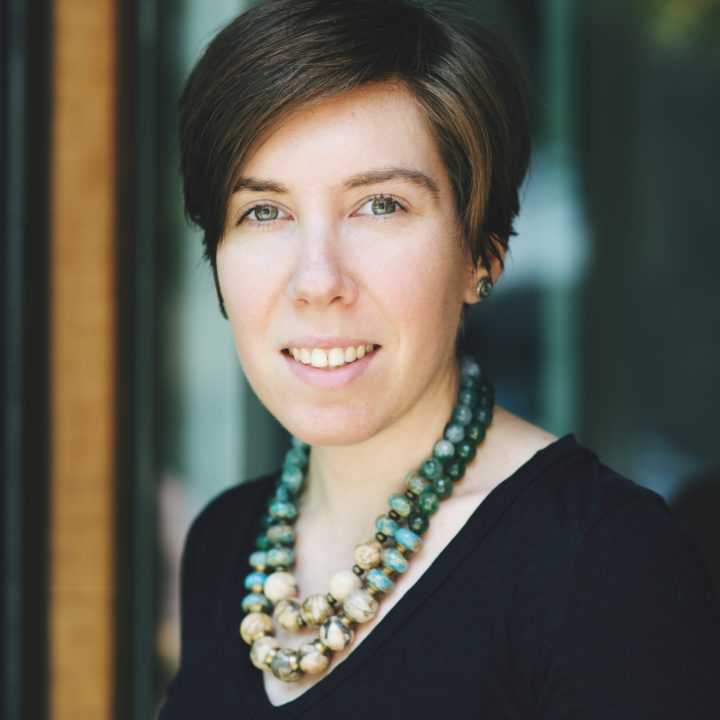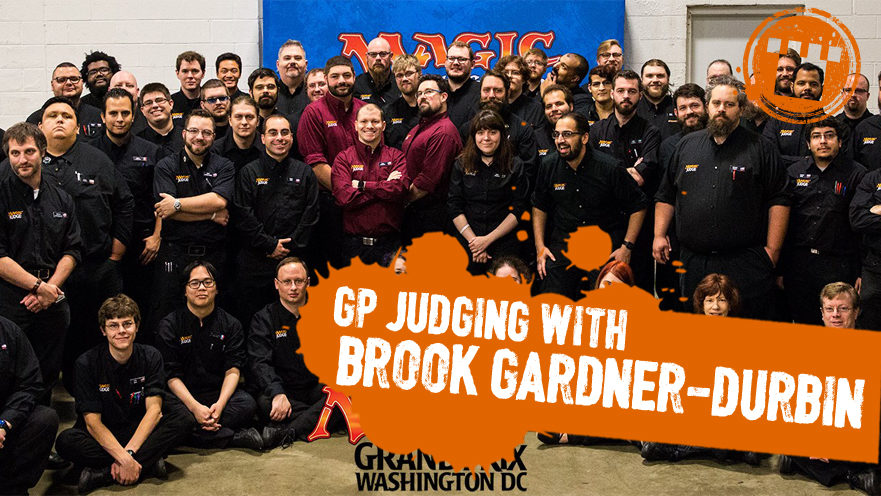Judges are some of the hardest-working members of the Magic community. They build and maintain healthy communities at local game stores, set and enforce equitable tournament policy, and make sure Magic‘s largest events run smoothly. Over the years, I’ve been especially impressed by the judges I know who regularly travel to Grand Prix, where they spend long days overseeing events, manning registration booths, packing and distributing swag bags, checking decklists, and communicating with the coverage team – all while making sure players have the best experience possible. For more insight into the life of a traveling judge, I consulted my friend Brook Gardner-Durbin, a Level 2 judge from Montana and a mainstay of the Grand Prix scene.
How long have you been a judge, and why did you join the Judge Program?
I became a judge four years ago, somewhere around late August/early September. There was a judge conference at my local game store, but I wasn’t interested in being a judge. My then-girlfriend convinced me I could probably pass the test thanks to my good rules knowledge, so I went to try to get a couple of judge foils, figuring I’d never actually work as a judge. I passed.
I first started working as a judge at prereleases, because I prefer playing constructed to sealed. Judging the prereleases let me see my friends and trade, generally participate in the community — without needing to play a format I disliked.
I found I enjoyed judging more than I had anticipated. I started doing more local events and, after a while, found myself the de facto judge leader in the state. I was certified as a level two judge at GP Portland in 2014, which I wanted so I could certify other people for level one and help build the community.
The first GP I judged was the second Vegas, in 2015. As before, I was surprised to discover I enjoyed it more than I expected to. I applied to the next GP I could as soon as I got home, and before long, I was applying to everything I could. I just got home from working GP DC, which was my 25th GP as a judge.
How many events do you typically judge each year?
It’s hard to give a yearly estimate because I’ve only been working GP’s for about two years, and I was a very different judge those two years. The first year, I wasn’t applying as often to events because of school obligations, and generally still feeling the whole thing out. And when I did apply, I was still pretty green and unknown, so I was declined more often than now.
Over the last two months, I worked SCG Cincinnati, GP Toronto, GP Minneapolis, SCG Richmond, GP Indianapolis, and GP DC, which was a lot. That was definitely above-average for me — usually I can’t work Star City Tour events because they’re too far east for me to get to from Montana without losing money, but these two fell into my lap. How busy I am also fluctuates with the release schedule — WotC never has GP’s over prerelease or release weekends, and Pro Tours are also blacked out, so there are stretches where GP’s are more or less frequent. At the moment, after working four GP’s over seven weekends, my next GP won’t be until Phoenix — close to two months away. Before then, however, I’m getting my first shot at head-judging a Star City Classic event, which I’m extremely excited for.
How do you feel about being away from home for so many weekends each year? How do you balance your work as a judge with other responsibilities?
I’m fine with being away from home frequently at the moment, because I don’t have any real ties to home — it’s more “a place I’m living” than “home.” One of my favorite perks of traveling to GP’s frequently is picking up art from all the artists, but most of it I haven’t bothered to put up on the walls. I just have a stack on top of a dresser. I’m looking into moving, but don’t have a real idea of where I’d like to move to.

Let’s talk about the first GP you judged. What did you learn and how have you grown since then?
My first after being certified for L2 was GP Vegas in 2015. I don’t remember many specifics, beyond enjoying it more than I expected to. I was just in awe of everything, and overwhelmed.
“How have I grown since then?” is a big question — I could fill a phone book. There are a couple of jokes in the judge program about what it’s “really” there for. I’ve heard it said that “the judge program has a really good cult … ture of self-improvement” or that it’s a “self-help program with a judging problem.” The judge program has a big emphasis on everyone helping each other grow through honest, constructive feedback. Judges help each other improve through everything from short conversations after taking a call together, to sitting down for an extended back-and-forth after an event, to written reviews, and any number of other ways.
Just as a judge, I’ve improved immensely since then. More importantly, I’ve certainly matured as a person since I started participating more in the judge program. I’ve learned things that I can apply to every aspect of my life, from jobs to relationships.
What roles have you served in a GP judge staff? What is your favorite role?
I’ve been a floor judge, and a team lead for every team on the main event. On sides, I’ve been the team lead for both on-demand events and scheduled events, as well as stepping into the role of overall sides lead once when the scheduled lead was hurt and had to leave early.
I enjoy working as a team lead in any position. One of my big motivations for wanting to get to level three is that GP’s usually reserve the Saturday team lead positions for L3’s, so being certified for that would allow me to be a team lead more often.
Judging a multi-day event can be grueling. What tips do you have for staying sharp and sane during a long day of judging?
Take care of yourself. The event will continue to run if you take five minutes to get off your feet for a moment and get a drink. It’s tempting to stay up late hanging out with friends you don’t see often, but you also need to make sure to get enough sleep.
(I have acquired a reputation in the Judge Program for being able to fall asleep at the drop of a hat.)
What is your favorite city that you’ve visited while judging an event?
Orlando or Mexico City. One of the best judging trips I’ve had was a three week trip where I chained Orlando into San Antonio into Mexico City. I looked at the flights, and it made more sense to go directly from one to the next instead of flying home and then back out again, so I got to spend more time than usual at each city.
At GP Orlando, I was staying in an AirBnB with a rotating cast of other judges and players for close to a week. We were next door to a grocery store, so we all took turns cooking meals for the whole house. There was a swimming pool and a hot tub, where we spent a lot of time. In between, we’d draft Modern Masters.
Orlando was also my first time being trusted with a lead position on sides, which was a great.
Mexico City was my first experience judging an event where English wasn’t the native language. I managed to navigate a couple of calls without verbal communication, and several others through translators, which was a new experience. At one point, I took a call and neither player at the table spoke English, so I dropped the phrase I’d memorized on the plane ride in: “Lo siento, yo no hablo Espanol. Un momento…” (“I’m sorry, I don’t speak Spanish. Just a moment…”), and went to grab a translator. It turned out the closest Spanish speaker was the head judge of the event, so I took a call with the head judge of the event hearing every word, which felt a little odd. Usually the head judge will only be at a table discussing a ruling if one of the players has appealed. The best part was that he translated everything until I delivered my final ruling, at which point he cocked his head and squinted a little, stepped away to double-check my ruling with another nearby L3, then came back and finished delivering my ruling.
I also had time to do some sightseeing, which was fantastic.
Any stories you’d like to share from your years judging at GP’s? (A proud moment? A good learning experience?)
One of my proudest moments was early on, at my fourth GP. I was watching a match near the end of time in the round, which had a clogged board state. After some time, I asked one player to play faster, he didn’t, and a bit later I issued him a slow play warning. Matt Sperling happened to be watching the match, and later wrote a little about it, which got me a little attention (for the record, I did realize the player could pseudo scry his whole deck at this late stage of the game). It also inspired me to write my first article for the Judge Blog.
A good learning experience was at my most recent GP, in DC. I was scheduled to lead the deck check team on Sunday, which was a first for me. I didn’t prepare enough, and it showed. One of my big goals at every event is to help the judges on my team finish the day as better judges than when the day began, but I was behind the ball all day and didn’t get the chance to work with them as much as I should have. I doubt anything seemed off to the players, but other judges on staff whose opinions I care about certainly could tell I was performing below expectation. I was very disappointed in myself, and I’ll be using that as motivation to do better at every event I go to for the foreseeable future.
What is your favorite thing about being a judge?
I enjoy the challenge of it. I still love playing competitively, and judging scratches a lot of the same competitive itches. There’s always something new to learn, something to do better than last time — being assigned a new role feels a lot like trying to learn a new format.
I also enjoy teaching others, which is a large part of why I enjoy being a team lead. It feels good to know you’ve had a positive impact on someone.
Another big perk is being able to travel frequently, which I enjoy. One of the other reasons I’d like to get to L3 is to make traveling internationally more viable, which would be a blast.
What are your goals for next year? Longer-term?
I’m going to continue judging as often as I can, learning what I can, and continue working toward L3. I decided that was something I wanted to pursue about a year ago, and getting there within the next year feels like a realistic goal at the moment. Getting to L3 would mean I would be eligible to judge at the Pro Tour — one thing on my bucket list is to get to the Pro Tour as both a judge and a player.
Longer term, the sky’s the limit. I want to continue learning and improving, and go wherever that takes me.
If you have any other questions for Brook about his experience as a judge, you can ask him on Twitter @TheBG_D.
Header design: Justin Treadway
Photos provided by Brook Gardner-Durbin, c/o Magic Judges

Hallie served as Content Manager for CardKingdom.com and editor-in-chief of the Card Kingdom Blog from 2017-2022. Part tournament grinder, part content creator, Hallie is always looking for ways to improve her game and to share what she learns with others.

